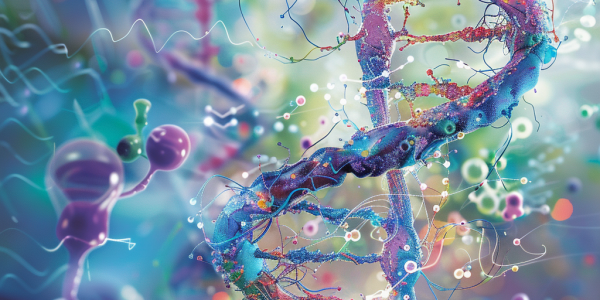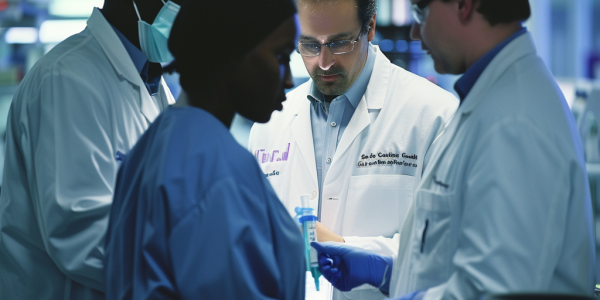Revolutionizing Radiology: AI Enhances Diagnostics and Patient Care
The integration of artificial intelligence (AI) in healthcare, particularly in radiology, is transforming diagnostics. Companies like Qure.ai are leading this change with advanced AI tools that enhance efficiency and accuracy, significantly improving patient outcomes. AI’s ability to swiftly analyze medical images, such as X-rays and CT scans, is crucial in areas with limited access to radiologists, offering timely diagnoses and reliable results. As AI continues to evolve, its collaboration with healthcare professionals promises to redefine standards of care in medical imaging.
Breakthrough CD7 CAR-T Cell Therapy Shows Promise for T-ALL Patients
The National University Health System in Singapore has announced groundbreaking results from a novel CAR-T cell therapy targeting CD7, offering new hope for patients with relapsed or refractory T-cell acute lymphoblastic leukaemia (T-ALL). This innovative treatment, developed in partnership with the National University of Singapore, modifies patients’ T cells to enhance immune responses against cancer cells, showing promising outcomes in clinical trials. With the potential to improve survival rates and quality of life, this therapy represents a significant advancement in precision medicine for aggressive leukaemia.
Nobel Prize in Physiology 2024 Awarded for Groundbreaking MicroRNA Research
The 2024 Nobel Prize in Physiology or Medicine has been awarded to American scientists Victor Ambros and Gary Ruvkun for their groundbreaking research on microRNA, which is crucial for gene expression regulation. Their work reveals how microRNAs control cellular differentiation, impacting the development of complex life forms. This recognition underscores the importance of microRNA in health and disease, paving the way for potential therapeutic advancements.
WHO Approves First Diagnostic Test for Mpox Amid Rising Cases in Africa
The World Health Organization (WHO) has approved the first diagnostic test for mpox, formerly known as monkeypox, marking a significant advancement in combating the virus. With over 30,000 cases reported in Africa, this test is set to enhance detection capabilities, especially in outbreak regions. Developed by Abbott Molecular, the Alinity m MPXV assay provides results in under 115 minutes, crucial for timely public health responses. As countries like Ghana report new cases, the WHO’s proactive measures aim to control the spread of mpox effectively.
New Research Uncovers Metabolic Disruptions in Parkinson’s Disease
Recent research from Fujita Health University reveals significant metabolic disruptions in Parkinson’s disease, particularly in purine metabolism and ATP recycling. The study highlights lower uric acid levels in PD patients, suggesting a complex relationship influenced by factors like sex and age. These findings pave the way for innovative therapeutic strategies aimed at enhancing energy metabolism, potentially improving the quality of life for those affected by Parkinson’s disease.
Innovative Research on Tribbles Proteins Offers Hope Against Antibiotic-Resistant Tuberculosis
Tuberculosis (TB) poses a significant global health threat, claiming 1.5 million lives annually, exacerbated by antibiotic-resistant strains. Researchers at the University of Sheffield are exploring the Tribbles protein family to enhance immune responses against TB. Their groundbreaking study reveals that Tribbles1 could be key in developing novel therapies that boost the body’s defenses, offering hope in the fight against antibiotic resistance and improving global TB management.
Kidney Week 2024: ASN Announces Early Programs for Nephrology Professionals
The American Society of Nephrology (ASN) is set to host Kidney Week 2024 from October 23, featuring specialized early programs on nephrology topics. Attendees can earn continuing education credits while exploring critical issues in acid-base balance, kidney stone management, genome engineering, and critical care nephrology. Registration details are available on the Kidney Week website.
Study Links Prenatal Prednisone Exposure to Long-Term Osteoarthritis Risk in Female Offspring
Recent research reveals the harmful effects of excessive prenatal prednisone exposure on female offspring, linking it to chondrodysplasia and increased osteoarthritis risk. Conducted by researchers from Wuhan University, the study highlights the need for careful medication management during pregnancy and suggests potential intervention strategies to mitigate long-term health risks.
Rising Celiac Disease Diagnoses Among Older Adults
An increasing number of adults, especially those over 50, are being diagnosed with celiac disease, an autoimmune disorder triggered by gluten. Symptoms vary widely, making diagnosis complex. A strict gluten-free diet is essential for management, and resources are available to assist individuals in transitioning to this new lifestyle. Awareness and support are key for those navigating life with celiac disease.
Harvard Student’s 720-Egg Experiment Challenges Cholesterol Myths
A bold experiment by Harvard PhD student Nick Norwitz, consuming 720 eggs in one month, challenges the conventional wisdom about eggs and cholesterol. Despite ingesting 133,200 mg of cholesterol, Norwitz experienced an 18% drop in LDL cholesterol, sparking renewed discussions among nutritionists about the health implications of egg consumption. This surprising outcome may lead to a reevaluation of eggs as a dietary staple and highlights the complexity of nutritional science.










